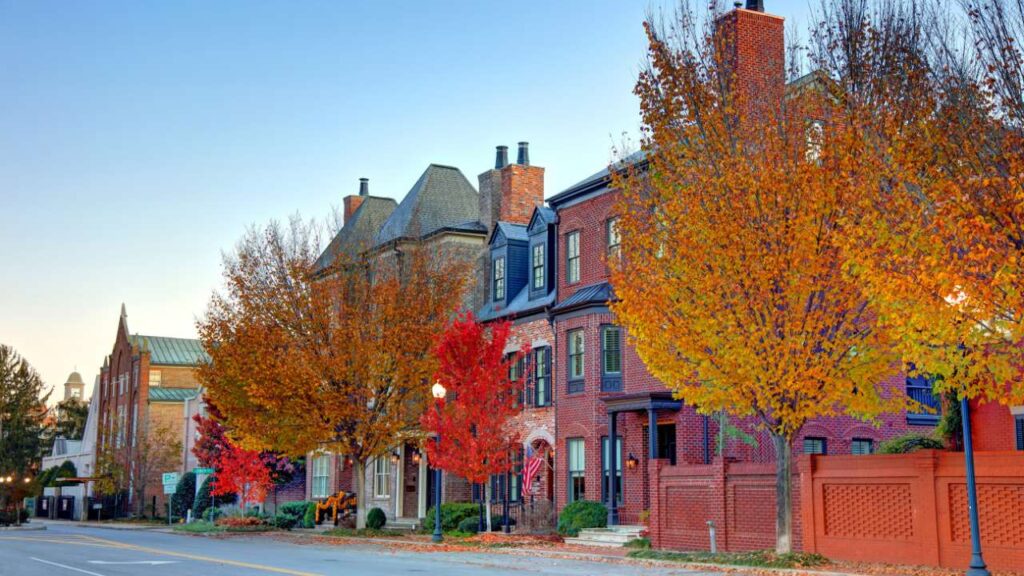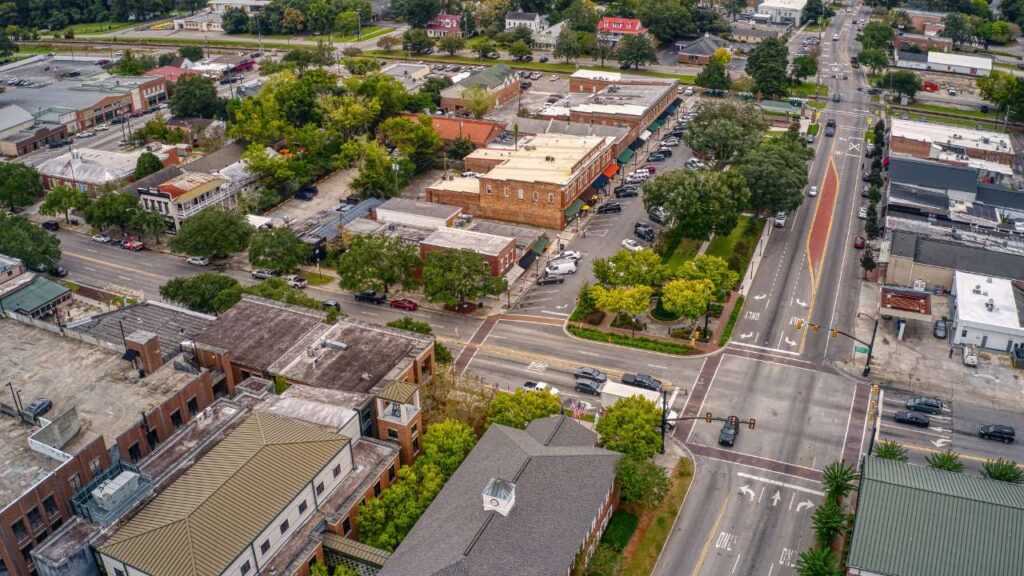Ready to start a business but don’t want to be in a big city?

To make things easier, we’ve looked at the best small towns where you can consider starting your business this year. Each of these places has seen rapid population growth in the past decade.
So no matter what business you want to start, the pool of potential customers in these towns will increase each year.
Contents
- 1. Franklin, Tennessee
- 2. Bend, Oregon
- 3. Asheville, North Carolina
- 4. Georgetown, Texas
- 5. Lehi, Utah
- 6. Hoboken, New Jersey
- 7. Summerville, South Carolina
- 8. Meridian, Idaho
- 9. Auburn, Alabama
- 10. Fort Myers, Florida
- 11. St. George, Utah
- 12. Cape Coral, Florida
- 13. Santa Cruz, California
- 14. Kyle, Texas
- 15. Westfield, Indiana
1. Franklin, Tennessee
2010 Population: 62,487
2023 Population: 88,723
Situated just a stone’s throw from Nashville, Franklin is more than just a suburb; it’s a business hub in its own right. Since the closure of a few industrial plants a decade ago, the city has leaned into tech and healthcare, igniting a population boom. From quaint boutiques to up-and-coming tech startups, the business landscape here is as diverse as it is promising.
2. Bend, Oregon
2010 Population: 76,693
2023 Population: 103,641
Nestled in the high desert of Oregon, Bend has transformed from a sleepy lumber town to an entrepreneurial playground. Primarily driven by the tech industry and tourism, Bend has seen its population more than double in just over a decade. The city is not just about beautiful vistas; it’s also an increasingly good place to do business.
3. Asheville, North Carolina
2010 Population: 83,393
2023 Population: 469,015 (Metro Area)
Located in the Blue Ridge Mountains, Asheville has blossomed into much more than just a tourist destination. With an influx of young professionals and artists, the city has witnessed a surge in startups, especially in the food and arts sectors. This new wave of residents has sparked a cultural and economic revitalization, making Asheville a hotspot for new businesses.
4. Georgetown, Texas
2010 Population: 47,400
2023 Population: 92,161
Georgetown, not far from Austin, has attracted many entrepreneurs due to its rapid population growth and friendly business climate. A popular choice for retirees also means a market for service industries.
5. Lehi, Utah
2010 Population: 47,407
2021 Population: 86,284
Located in the tech-savvy region known as Silicon Slopes, Lehi is ideal for tech startups. With a young, educated population, it’s a town on the rise.
6. Hoboken, New Jersey
2010 Population: 50,005
2023 Population: 55,067
Just a ferry ride away from Manhattan, Hoboken offers the proximity to big-city resources without the New York City costs. Ideal for small consulting firms or artisan shops.

7. Summerville, South Carolina
2010 Population: 43,392
2023 Population: 56,512
Known as “The Flower Town in the Pines,” Summerville has seen a steady increase in population and local businesses. It’s a prime spot for those looking to start retail or hospitality ventures.
See: 6 Cheapest Beach Places to Live In South Carolina
8. Meridian, Idaho
2010 Population: 75,092
2023 Population: 139,422
Meridian is one of the fastest-growing cities in Idaho, and its low-cost living and great community make it a suitable place for startups, particularly in healthcare and tech.
9. Auburn, Alabama
2010 Population: 53,380
2023 Population: 83,015
Home to Auburn University, this town offers a skilled, educated workforce. The city focuses on manufacturing and technology, making it an excellent place for similar ventures.
10. Fort Myers, Florida
2010 Population: 62,298
2023 Population: 105,260
Fort Myers, perched on the Caloosahatchee River, is more than just a spring break destination. Over the last decade, this sunny locale has expanded its scope, adding industries like healthcare, technology, and real estate to its tourist-based economy. This diversification has helped it to grow steadily both in population and economic opportunities. Its attractive climate and beautiful beaches add to its appeal, making it not just a great place to live, but a burgeoning spot for businesses.
11. St. George, Utah
2010 Population: 72,897
2023 Population: 108,535
Tucked in the southwest corner of Utah, St. George has become something of a magnet for people looking to escape the hustle and bustle of bigger cities. It’s not just the landscape that’s attracting new residents—St. George has a thriving business community, particularly for those in the healthcare and education sectors. The town’s growth is well-supported by a skilled, educated workforce, largely thanks to the influence of Dixie State University.
12. Cape Coral, Florida
2010 Population: 154,305
2021 Population: 221,997
Cape Coral, known for its beautiful canals and waterfront wonder, isn’t just a haven for retirees or those looking for a vacation home anymore. With its sprawling growth, it’s become fertile ground for businesses, especially in construction, healthcare, and the service industry. This growth doesn’t show signs of slowing down, either. With more and more young families moving in, there’s a growing demand for a wide range of services and retail.

13. Santa Cruz, California
2010 Population: 59,946
2023 Population: 64,608
Located on the scenic northern edge of Monterey Bay, Santa Cruz is often associated with its iconic beach boardwalk and surf culture. But it’s not all fun and games; this California town has a growing tech scene and strong ties to nearby Silicon Valley. Businesses related to outdoor recreation, health, and sustainable technologies often find a warm welcome here. The town’s eclectic and well-educated population makes it an excellent market for niche or specialty businesses.
14. Kyle, Texas
2010 Population: 28,016
2023 Population: 64,339
Just a 20-minute drive from Austin, Kyle has experienced impressive growth over the last decade. As businesses and people spill over from the crowded Austin area, Kyle is quickly becoming a hub for smaller tech startups, health services, and retail. The city has invested in infrastructure to support this rapid growth, making it a practical and attractive location for new businesses. With the population nearly doubling over the past decade, demand for services and retail is high.
15. Westfield, Indiana
2010 Population: 30,068
2023 Population: 58,410
Located north of Indianapolis, Westfield has seen steady growth in population and business opportunities. The town has done particularly well in attracting families, which creates a stable market for educational services, healthcare, and other family-oriented businesses. The local government is very pro-business, offering various incentives to attract startups and small businesses. With its high quality of life and convenient location, Westfield is quickly becoming a go-to place for new ventures.
More From Dollar Sanity:
12 Ways To Make Money In a Small Town
12 Businesses to Start with $500 or Less
10 Profitable Family Business Ideas to Start Right Now

David Bakke is a personal finance expert and the published author of the book ‘Don’t Be A Mule.’ Specializing in money management, investing, retirement, income generation, and entrepreneurship, he earned his Bachelor of Arts in Creative Writing from the University of South Florida. David started his own blog, YourFinances101, in 2009. His writing has been featured in Investopedia, Business Insider, US News, and Money Crashers.
